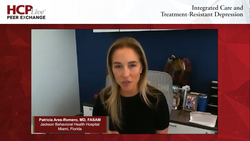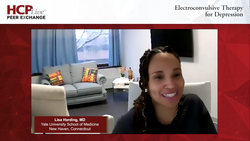Evolving Management Strategies for Treatment-Resistant Depression - Episode 1
Prevalence of Treatment-Resistant Depression
Dr Angelos Halaris provides clarity to the definition of treatment-resistant depression and suggests what may contribute to high prevalence rates.
Steven Levine, MD: Hello, and welcome to this HCPLive® Peer Exchange titled “Evolving Management Strategies for Treatment-Resistant Depression.” I’m Dr Steve Levine, a cofounder and the chairman of the board of Heading Health in Austin, Texas. Joining me in this discussion are my colleagues Dr Angelos Halaris, a professor of psychiatry at Loyola University Chicago Stritch School of Medicine in Chicago, Illinois; Dr Lisa Harding, a clinical instructor at Yale School of Medicine in New Haven, Connecticut; and Dr Patricia Ares-Romero, the chief medical officer of Jackson Behavioral Health Hospital in Miami, Florida.
Treatment-resistant depression [TRD] is a common and burdensome condition with poor outcomes and few treatment options. Our discussion today focuses on advances in the management strategies for treatment-resistant depression, as well as a review of the fundamentals of certified treatment centers for the dispensing and administration of esketamine. Welcome, everyone. Let’s get started.
To begin, let’s discuss the concept of treatment-resistant depression. There isn’t universal consensus on a definition of TRD, so at what point do we clinically think of a patient as treatment-resistant? Angelos, would you like to speak to that first?
Angelos Halaris, MD, PhD, APA, ACNP, CINP: Yes, I’d love to. The definition of treatment-resistant depression is multifaceted. Not everybody agrees. There’s an operational definition that says the patient qualifies for the designation of TRD if they have had at least 2 adequate trials of antidepressant medication and inadequate response, no response at all, or intolerable adverse effects that precluded continuation of treatment.
Adequate response is defined as consisting of adequate dosing, following the package insert or the experience of the practitioner, a dose range that is generally viewed as being sufficient to produce response if not outright remission, and an adequate length of treatment, which varies. Some practitioners think 4 to 6 weeks is adequate. In my view, this is woefully inadequate. We should be looking at no less than 3 months to complete the stipulation of adequate length of treatment. If we haven’t seen a significant response, if not remission, in 3 months, then the patient qualifies as having failed this particular treatment.
Steven Levine, MD: Thank you, Angelos. How common is this? What would you say is the prevalence of treatment-resistant depression?
Angelos Halaris, MD, PhD, APA, ACNP, CINP: It is surprisingly high. Given that depressive disorder in its various facets and variations has a prevalence rate of 15% to 20% in the population worldwide, treatment-resistant depression accounts for at least one-third of these patients. With the TRD study, which was published about a decade ago, we saw, by agreement, that a third of the patients with major depressive disorder [MDD] failed to remit. Another third showed some response that may or may not be sufficient for the patient to go on. A full third had no response at all. Treatment resistant, summarily, is at least 35% of the entire population of patients with MDD.
Steven Levine, MD: We’re talking about a ton of patients here.
Angelos Halaris, MD, PhD, APA, ACNP, CINP: Absolutely.
Steven Levine, MD: In your opinion, what may account for these high rates of partial or inadequate response?
Angelos Halaris, MD, PhD, APA, ACNP, CINP: Both depression and the response or lack thereof are multifactorial. The factors can range from starting out with inaccurate diagnosis, poor diagnosis, or false diagnosis; or inadequate dosing, meaning an inadequate trial, underdosing, or what we refer to as placebo dosing, which can go on forever. I’ve seen cases that are very painful and distressing. There are other factors that go beyond these technical aspects, such as undiagnosed or untreated endocrinopathies, and vitamin deficiencies that have not been correctly diagnosed and measured.
There are other factors that go into the area of genetic testing, such as the serotonin transporter gene. If it’s present in a homozygotic short-term allele, that may interfere with the ability of an SSRI [selective serotonin reuptake inhibitor], or even an SNRI [serotonin-norepinephrine reuptake inhibitor], to be effective. Then there is the whole issue of nonpharmacological interventions that have to do with life events, especially early life childhood trauma. Time and again, we find out that early childhood trauma can have permanent long-term sequelae, such as nonresponse or poor response to antidepressant medication. Assessing life history is important, and then adding to the pharmacology, pharmacotherapy, and psychotherapeutic interventions and picking the most appropriate psychotherapeutic modality.
Steven Levine, MD: Thank you for watching this HCPLive® Peer Exchange. If you enjoyed the content, please subscribe to our e-newsletters to receive upcoming Peer Exchanges and other great content right in your in-box.
Transcript Edited for Clarity



